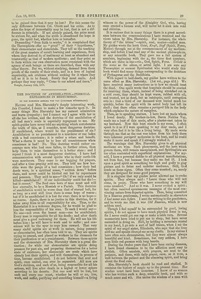
Legend
< Spiritualism and the Theosophists (continued from page 4-151) >
the final separation of the spirit, but in process of dissolution with the astral body. And no one, I think, would probably recognise and lament more than Col. Olcott, that neglect of ancient philosophy which makes it possible for a western scholar to say that he hears now, for the first time, the doctrine that this divine and alone immortal spirit has to be united in consciousness with the individual, in order that the latter may participate in its immortality. But M.A., Oxon., could hardly have said this, had he read Mr. Maitland’s book on The Soul and How it found Me, or even my review of that book in these pages. But are Col. Olcott and M.A., Oxon., such poles asunder on this doctrine of potential im- mortality, and is the latter so sure that he himself represents the “usually received” doctrine of human immortality? Let us hear him. “I hanker after the old and nobler faith that man has in him the promise and potency of immortality; that he may delay his realisation of his inheritance, that he may, in rare and obstinate cases of rejection of all light, sink into darkness and final death, but that for the children of men at some far distant day the darkness shall turn to light, the potency become fruition.” (The italics are mine.)
Again, “But if by a course of preferred vice, by ingrained preference for the ‘earthly, sensual, devilish,’ he chooses evil and refuses good, then, by the action of the same invincible law he sinks lower and lower, till beyond hope. But these cases are few and far between.” If words have any meaning, M.A., Oxon, no more than Col. Olcott, attributes to man an inherent and inalienable immortality. If it is in man’s nature, good, or bad, to be immortal, then no “ingrained preference” can make him lose it; and this is the “usually received” doctrine. But if not, must not immortality, that is to say, life no longer precarious and probational, but assured, be the consequence of the addition or complete union with some being that possesses this prerogative? And until this union is effected, is it not more proper to say that immortality has to be gained than that it may be lost? For this seems the only difference between Col. Olcott and his critic. As to when the hope of immortality may be lost, that is not a difference in principle. If not already gained, the prize must be striven for, and when the strife is abandoned the hope is gone, the spirit lost, whether here or hereafter.
Descending “from faith to works,” it is complained that the Theosophists offer no u proof” of their u hypotheses,” their elementaries and elementals. They tell us the teaching of the great masters of occult learning and experience, from whom they derived it; of testimony at least as abundant and trustworthy as that of modern mediums; and they point us to facts within our own observation more consistent with the agency of such beings as these are described, than with any other theory. But we, without studying, demand from them proofs of the results of their study, and in a love of logical superiority, ask evidence without seeking for it where they tell us it is to be found. Surely they must smile. And perhaps they may reply, “Come to our school and learn.”
Temple, January 13th, 1878.
The Doctrine of Annihilation–Personal Experience in Mediumship
Having read Mrs. Blavatsky’s deeply interesting work, Isis Unveiled, I desire to make a few remarks upon it. In many things Mrs. Blavatsky has my earnest admiration and warm sympathy; but I cannot say I agree with her in all she has written, and the doctrine of the annihilation of all bad men’s souls is especially repugnant to me. My spirit-guides have never told me anything which corroborates the truth of this, as I consider, most dangerous doctrine. If annihilated, where would be the punishment of sin? Annihilation is no punishment to a murderer or one laden with a bad conscience; it is rather a solace and benefit. What a charm it must be to lose all consciousness when conscience is bad! No. This doctrine would rather encourage men who had once fallen, to further crime, than help them to raise themselves to a better state: and I repeat I think it a most dangerous doctrine. I have had communication with several spirits who in their earth-life were murderers. They came to me begging for prayers, and after a time praying with me. They told me how horrible were the pangs of a bad conscience; how their bad deeds were, in. a spiritual sense, “written down” before them, and never could be blotted out but by repentance and penance. They said to me—“Oh! if we only could be killed—annihilated! If our individuality could but die!—but it cannot" The Soul once born of man must and will live eternally, be he a Messiah or a Pariah. This doctrine of annihilation would be worse than that of eternal hell, for so long as a soul still lives there is some hope of rescue; but if it be annihilated it is lost for ever: there is no hope— no rescue. Again, there is no justice in this doctrine, for it takes away from us all responsibility for sin. Thus, to the Materialist it is a welcome dogma, for he would be glad to lose the responsibility of his sins. To such I would say— No one—not even the basest man—can be annihilated. Every man is responsible for all his deeds; and after death must give a good reckoning for them. He will see his life before him: he will have to work and to suffer; and conscience will be the spur to urge him onward. That very many sinful spirits are at work in nature, doing penance as elementaries, has often been told to us. They are spirits trying to amend, and placed as workers in the elements for their purification or as a punishment. Between these spirits and the elementals of Mrs. Blavatsky there is a great distinction; for while our elementaries are spirits doing penance for past sin, and preparing themselves for a better state of existence, her elementals are souls which have already lost their spirits, and will themselves, in process of time, become annihilated.*) I do not believe that soul and spirit, once united, can ever be separated. All men are God’s children, and each of us, being responsible for all his actions, will live after death in a higher or lower sphere according to his deserts. Not one soul will be lost, but each and every one must, whether he will or no, live, work, and suffer, purifying and ennobling himself—a living witness to the power of the Almighty God, who, having once erected a human soul, will never let it sink into void and oblivion.
It is curious that in many things there is a great accordance between the communications I have received and the If views taken by Mrs. Blavatsky. For instance, the whole theory of u the triune”—spirit, soul, matter—called man. My guides wrote the book Geist, Kraft, Staff (Spirit, Force, Matter) through me at the commencement of my mediumship, and before I had read any of the ancient philosophers, or any scientific book. They gave me a full system of numbers, beginning with the A, the three first numbers, which are three in one—viz., God, Spirit, Force. Urlicht is the same as the akasa, or astral light. I am sure any Theosophist or earnest Spiritualist who would study this book would find many things corresponding to the doctrines of Pythagoras and the Buddhists.
With regard to half-death, my guides have written to the same effect as Mrs. Blavatsky. (1st vol., page 452.) We have received many instructions as to how we should treat the dead. One spirit wrote that hospitals should be erected for receiving them, where, instead of being stretched out in a cold room, they should be kept warm, rubbed with oil, and treated, not as dead, but as cataleptic, until corruption sets in: that a third of our deceased were buried much too quickly, before the spirit with its astral body had left its shell; that there often remains a perisprit life in the body which explains the nature of vampires.
Then, as to speaking statues. I have lost an uncle whom I loved dearly. My brother-in-law, Baron Nicklos Vay, <... continues on page 4-153 >
(*) Quite the reverse. Never said such a thing and the “Isis” is then to show the mistake. Either the fair Baroness has not read at attention, or she did not understatnd it.
Editor's notes
- ↑ The Doctrine of Annihilation–Personal Experience in Mediumship by Vay, Adelma Von, London Spiritualist, No. 282, January 18, 1878, pp. 29-30
Sources
-
London Spiritualist, No. 282, January 18, 1878, pp. 29-30
